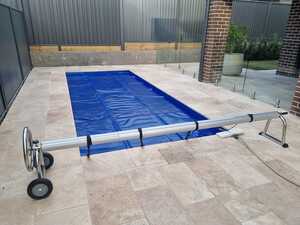Comparing Pool Materials: Fiberglass vs. Concrete vs. Vinyl
الجسم
When it comes to building your dream swimming pool, one of the most critical decisions you'll make is choosing the right pool material. Each material comes with its unique advantages and drawbacks, and the choice largely depends on your preferences, budget, and long-term plans. In this blog, we'll compare three popular pool materials: fiberglass, concrete, and vinyl, to help you make an informed decision about the best services available.
Fiberglass Pools
Advantages:
-
Low Maintenance: Fiberglass pools have a smooth, non-porous surface that resists algae growth and requires minimal maintenance. You'll spend less time cleaning and more time enjoying your pool.
-
Durability: Fiberglass pools are known for their durability. They are less likely to develop cracks and are resistant to temperature changes, making them suitable for various climates.
-
Quick Installation: Fiberglass pools are pre-molded and can be installed relatively quickly, reducing construction time compared to other materials.
Considerations:
-
Limited Design Options: While fiberglass pools come in various shapes and sizes, they may have fewer customization options compared to concrete.
-
Initial Cost: The upfront cost of a fiberglass pool can be higher than some vinyl pool options but typically lower than concrete pools.
Concrete Pools
Advantages:
-
Customization: Concrete pools offer nearly limitless design possibilities. You can create a unique shape, size, and finish to match your vision.
-
Longevity: When properly constructed and maintained, concrete pools can last for decades.
Considerations:
-
Maintenance: Concrete pools require more maintenance due to their porous surface, which can be prone to algae and staining. Regular resurfacing may be necessary.
-
Cost and Construction Time: Concrete pools are often more expensive and time-consuming to build than fiberglass or vinyl pools.
Vinyl Liner Pools
Advantages:
-
Affordability: Vinyl liner pools are typically the most budget-friendly option for both installation and maintenance.
-
Smooth Surface: Vinyl liner pools have a smooth surface, making them comfortable to swim in and relatively low-maintenance compared to concrete.
Considerations:
-
Lifespan: Vinyl liners have a limited lifespan (usually around 10-15 years) and will need periodic replacement.
-
Design Limitations: While vinyl liners come in various patterns, they may not offer the same level of customization as concrete pools.
Choosing the Best Services
Ultimately, the choice between fiberglass, concrete, and vinyl pools depends on your specific needs and preferences. It's important to work with a reputable pool installation company that can provide expert guidance based on your individual circumstances.
In this regard, we recommend considering the services of local pool experts like Awesome Pool and Spas. They have a track record of delivering high-quality pool installations, maintenance, and repairs in your area. Whether you opt for fiberglass, concrete, or vinyl, their experienced team can ensure you get the best services to create the pool of your dreams.
In conclusion, each pool material has its pros and cons, and the best choice depends on your budget, design preferences, and maintenance expectations. By partnering with a trusted pool installation and maintenance company, you can enjoy your pool for years to come, regardless of the material you choose.











تعليقات